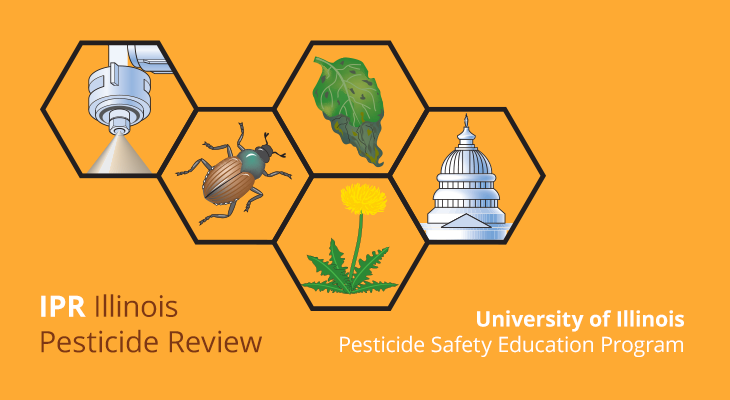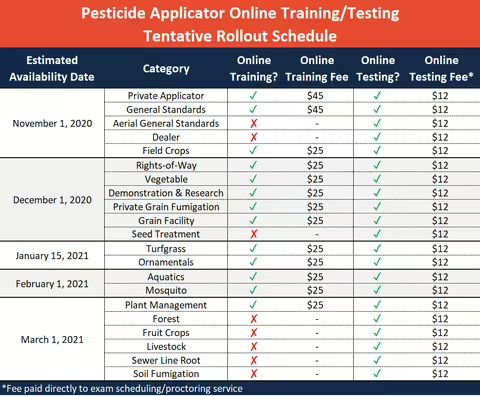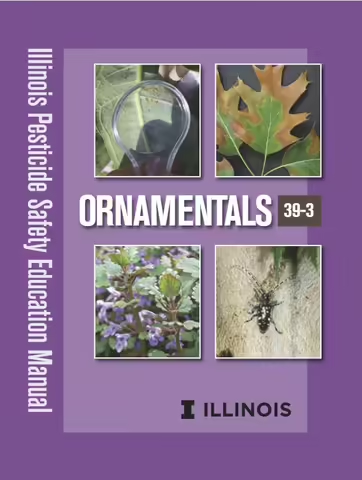
Illinois Pesticide Applicator/Operator Training & Testing Options for 2020-2021
By Matt Gill and Travis Cleveland.
Listen to the audio version of this article.
University of Illinois’ Pesticide Safety Education Program (PSEP)
will not offer in-person training during fall 2020 or spring 2021.
The decision to cancel in-person training was based on the health
of not only clinic attendees, but the staff and the surrounding
community with whom we share spaces. Additionally, in-person
training was not financially feasible given the current restrictions
which limit event attendance to the lesser of 50 persons OR
50% of the overall room capacity. In place of in-person training,
we plan to offer the following resources to individuals preparing
for Illinois Pesticide Certification Exams during the COVID-19
pandemic:
Training Option A: Online Training
In place of PSEP’s in-person training clinics, online courses will
be made available for most of our traditional training categories.
To best serve our diverse clientele, the courses are designed to be
completed asynchronously (i.e. on your own schedule and at your
own pace). Each course will guide you through lessons instructed
by PSEP specialists, and keep you engaged with plenty of exam prep
questions along the way.
Training Option B: Self-Study Publications
If you would rather study with a pen and paper instead of an
iPad, PSEP has an option for you as well. Training Manuals are
available for each category of licensure. Accompanying fill-in-the-
blank-style workbooks are available for common categories,
which will help guide you through the manual and prepare you for the associated exam.
Illinois Department of Agriculture (IDA) anticipates 15,000 – 20,000 certification exams will be offered during the 2021 certification year. In a typical year, most of these exams would be administered at in-person training and testing clinics. In the absence of in-person training clinics, IDA will utilize online testing and limited in-person testing to meet certification needs.
Testing Option A: Online Testing
Certification exams will be available in an online format through a commercial proctoring service. Exam length and time allotment will be similar to that of in-person testing. However, individuals will need to schedule each exam with the proctoring service, and pay the service’s $12 proctoring fee.
Testing Option B: In-Person Testing
For those needing an alternative to online testing, IDA will continue to offer in-person testing for all certification exams. Due to social-distancing requirements and occupancy restrictions, there will be limited availability of in-person testing sessions. IDA is working to increase location availability, and this will likely evolve rapidly over the next several months.
We are working to provide access to training and testing as soon as possible. With that in mind, the planned rollout of online training and testing will roughly follow the traditional availability of training sessions. The table printed below lists the tentative schedule. To keep up to date with training and testing availability options, please visit: pesticidesafety.illinois.edu
Ornamentals Manual Revised
Listen to the audio version of this article.
The Illinois Pesticide Safety Education Program Ornamentals (SP39-3) Manual has been updated for 2020 and is now available on the University of Illinois Extension PubsPlus storefront. Each copy of the manual costs $15 plus shipping and handling.
The Ornamentals Manual is tailored to the needs of commercial applicators managing ornamental plants in landscapes, nurseries and greenhouses and can be used for study or quick reference. The new version of the manual includes updated information on integrated pest management practices, diseases, insects, weeds, equipment, and calibration unique to ornamental areas. The manual includes color images of common pests and diseases, as well as, tables and keys to help identify pests based on pest appearance and signs of injury present on plants.
The Ornamental Manual is intended for commercial and non-commercial applicators who are preparing for their Ornamental Pest certification exam offered by Illinois Department of Agriculture.
Household Hazardous Material Collection Events Scheduled for Fall 2020
Listen to the audio version of this article.
Fall can be an excellent time for cleaning up your chemical storage area. Now is the time to get rid of any old or unwanted pesticides while this growing season’s use is still fresh in your mind. The household hazardous material collection schedule has been released to the public. More information can be found below. Here are a few options you have for disposing of your old or unwanted pesticides:
- Use them up. You can usually apply them to a labeled-use site regardless of whether or not pests are present. Be sure to read and follow all label directions. Sometimes pesticides are taken off the market, or certain uses are removed from the label. In those cases, existing stocks can typically still be used. Rarely does US–EPA order a stop-use on the product. However, it is illegal to apply old stocks of chlordane or 2,4,5-T. To learn about the registration status of your product in question, you can contact the manufacturer or the Illinois Department of Agriculture, (217)785-2427.
- Give them away. Fellow neighboring gardeners may be interested in your castoffs. It’s not recommended that you sell unwanted pesticides. To sell a pesticide legally, it must still be in the original packaging with the complete label. If the pesticide is restricted use, you must be licensed in order to sell it. If the product registration has been cancelled, selling is illegal.
- Take them to a hazardous waste collection event. The Illinois Environmental Protection Agency (IEPA) has scheduled a few one-day household hazardous waste (HHW) collection events to be held across Illinois this fall. See below for the schedule.
For a list of household hazardous waste materials that are acceptable or unacceptable at these collections, please visit the Illinois EPA’s Website.
If in doubt, it may be best to first contact the Waste Reduction Unit of the IEPA at (217)524-3300.
There are special hazardous material collection events for other non-household types of pesticides:
- Agricultural pesticides are collected at various scheduled “Agricultural Pesticide Clean Sweep” events. Contact the Illinois Department of Agriculture, (217)785-2427, for more information.
- Structural pesticides (those used by professional applicators to control pests in and around structures) are collected at “Structural Pesticide Clean Sweep” sites. Contact the Illinois Department of Public Health, (217)782-4674, for more information.
One-day Collection Schedule
Please note that some dates and events have already passed and are therefore, not listed here.
September 26: Kankakee
Kankakee Community College
100 College Dr.
Kankakee, IL 60901
October 3: Du Quoin
Du Quoin Elementary school
845 E Jackson St.
Du Quoin, IL 62832
October 10: Watseka
Iroquois County Administration Building
1001 E. Grant St.
Watseka, IL 60970
November 7: Springfield
Illinois State Fair Grounds (specific location TBD)
801 E. Sangamon Ave
Springfield, IL 62702
One-day collections are open from 8 am to 3 pm on the above scheduled Saturdays. Please note these are open to all Illinois residents. In addition, the following long-term facilities are available for disposal of HHW. Please phone ahead to determine availability and open hours.
City of Chicago:
Household Chemicals and Computer Recycling Facility
1150 N. North Branch on Goose Island
Tues: 7 am - noon
Thursday: 2 pm - 7 pm
First Saturday of each month: 8 am - 3 pm
For information: (312) 744-3060
Rockford:
Rock River Reclamation District
3333 Kishwaukee
Sat: 8 am - 4 pm
Sun: Noon - 4 pm
For information: (815) 987-5570
http://knib.org/recycling/green-guide/household-hazardous-waste-site/
Naperville:
Household Hazardous Waste Facility
156 Fort Hill Dr.
Sat: 9 am - 2 pm
Sun: 9 am - 2 pm
For information: (630) 420-6095
https://www.naperville.il.us/services/garbage-and-recycling/household-hazardous-waste-facility/
Lake County:
The Solid Waste Agency of Lake County (SWALCO) currently operates a long-term household chemical waste collection program. Information and a collection schedule can be found on the SWALCO Website or by calling (847) 336-9340.
For questions concerning the IEPA’s one-day or long-term collections, please call the Waste Reduction Unit at (217) 524-3300.
Tips for Harvest Safety
By Maria Turner
Listen to the audio version of this article.
Each year since 1944, the third week of September has been recognized as National Farm Safety and Health Week. Governor Pritzker proclaimed the week of September 20-26, 2020 National Farm Safety and Health Week in Illinois, with the theme “Every Farmer Counts”. There is nothing I am more passionate about than farm safety. Growing up in central Illinois on our family farm, I have been a part of or been witness to many accidents that could have been prevented, such as:
- falling off of a moving loaded hay wagon and breaking an arm,
- running in the dark after goats that got out from not closing a gate and tripping which caused 3 broken bones,
- riding bareback through a field on a running horse that spooked while attempting to jump a log, throwing a rider overhead, and
- burning a pile of leaves on a windy day that caught fire to the wheat field.
Accidents happen, right? As a kid, I know I pushed the envelope many times, and my mom always said that my guardian angel was working overtime.
Agriculture safety just stuck with me as I grew up. I met more people that had been involved in farm-related accidents and read more about farm safety. In my graduate studies, I focused on agriculture safety and health education and training first responders in grain entrapments. Today, I continue that work professionally for pesticide applicators but also personally for the twin daredevils I am raising. Together we practice safety skills and I hope to make them more aware of hazards.
The accidents that occurred to me as a child pale in comparison to more serious accidents that others have experienced, such as:
- a lost limb from an entanglement,
- a lost life in a tractor-automobile collision accident,
- an animal attack, or
- a grain entrapment.
So as we get ready to begin another busy harvest season, it is important for farm workers to stay safe. It is time to bring awareness to farm safety and prevent accidents. The latest data from the U.S. Bureau of Labor Statistics shows the agriculture sector is still the most dangerous in America. Each year the farming profession sees 581 fatalities, which equals 23 deaths per 100,000 workers.
A checklist of items that you should consider on your farm as you prepare for the harvest season includes the following:
Equipment Maintenance
To prevent your tractor and other important farm equipment from breaking down, make a list of what needs to be done to maintain them. Schedule time for these tasks to ensure they are completed.
Machinery entanglements are the leading cause of injury and death on the farm. Do everything you can to prevent it – including guarding or shielding all moving parts on machinery, and keeping bystanders and children away.
Lighting and Signage
As we prepare equipment to head out on to the roads, we should check lights and signals to ensure they are working properly. Be sure to check that slow moving vehicle (SMV) signs are attached and cleaned. Doing this, makes the SMV’s much more visible as the days are getting shorter and darker. When possible, avoid traveling on roadways during the busy morning and evening commute times. Use an escort vehicle when necessary.
Grain Bin Safety
Grain bins are one of the biggest safety hazards for farmers. Depending on the size and speed of the unloading auger, a person can be completely engulfed in less than 30 seconds, leading to suffocation. It is very important to be aware of the dangers around grain bins. Be sure not to enter a bin when the equipment is running. Grain should not be emptied or moved around when a person is in a bin. Use a harness or lifeline when working above the grain and use a long pole from the outside of the bin to break up the crusted grain.
Rest
We also need to make sure that we are getting enough sleep. It is easy to want to push on even when you are tired, but you are more likely to take shortcuts and make mistakes that could injure yourself or others when you are fatigued.
It is not a good option to turn to extra coffee, double espresso, or other caffeinated drinks as they will not give your body the rest it needs.
Nutrition
Eating nutritious snacks throughout the day can provide energy as well as mental food that your brain needs to make clear decisions and actions. Snacks should be items like nuts, fruits, vegetables or even some small grains. Trail mix can be easily made or bought in a pre-packaged amount and can provide a lot of great nutrition!
Personal Protective Equipment
Use personal protective equipment such as earplugs, gloves, and safety glasses when appropriate.
Even though farm safety week is over, we all should continue to do our part to make this a safe, healthy, and bountiful harvest season.
Download This Issue of the Newsletter
Download, save, and share the 2020 September/October issue of the newsletter.
Editorial Notes
The development and publication of this newsletter has been supported with funding from the Illinois Department of Agriculture.
Michelle Wiesbrook, Extension Specialist, Pesticide Safety Education
The Illinois Pesticide Review is published six times a year. For more information about pesticide safety or for more issues of this newsletter, please visit us at www.pesticidesafety.illinois.edu. You can also reach us at 800-644-2123.
Disclaimer: Mention of trade names in this newsletter is for general information purposes only and does not constitute endorsement of one product over another, nor is discrimination intended against any product.
Copyright © 2020, Board of Trustees, University of Illinois
Find Us On Social Media
We’re on Facebook! Follow our University of Illinois Extension Pesticide Safety Education (PSEP) page for updates on programs, news, and events.

